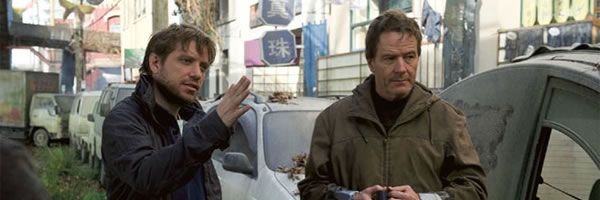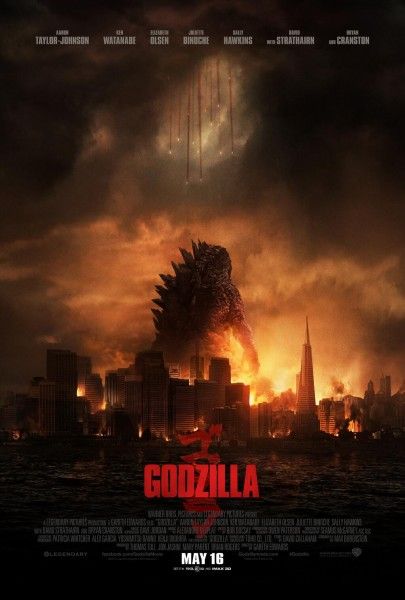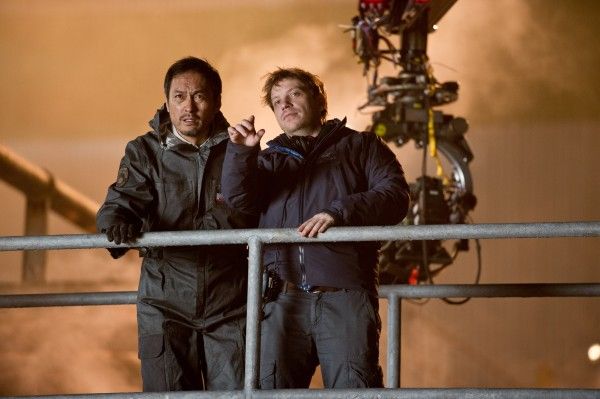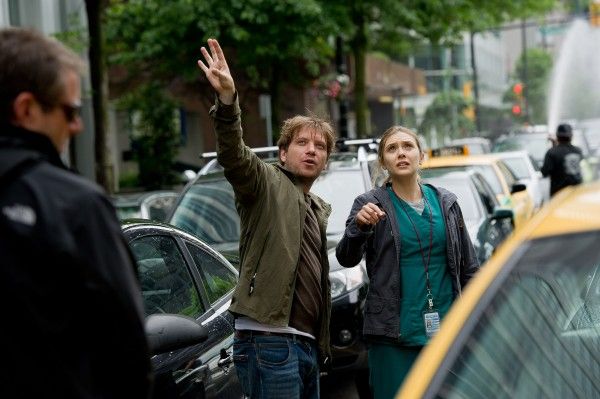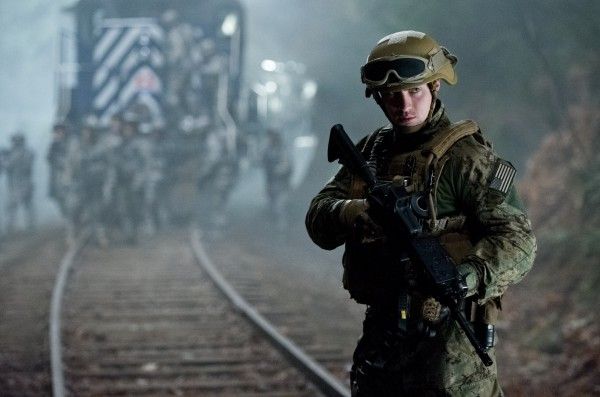Opening this weekend is director Gareth Edwards’ Godzilla. Produced by Warner Bros. and Legendary Pictures, the film is a new take on the classic monster and it's loaded with an awesome cast led by Aaron Taylor-Johnson, Elizabeth Olsen, Bryan Cranston, Ken Watanabe, Sally Hawkins, Juliette Binoche, and David Strathairn. For more on the film, watch a featurette on the new Godzilla roar, check out new images, watch 5 clips along with 11 minutes of behind-the-scenes footage, or click here for all of our previous coverage.
At last weekend's New York City press day, I was able to participate in a group interview with Gareth Edwards. He talked about Godzilla's new design, how he represents nature, the massive scale of the film compared to Monsters, and more. Hit the jump for what he had to say.
Question: In the movie and the marketing I know you've described Godzilla as a force of nature, could you talk about what events or forces of nature exactly inspired both Godzilla's devastation and his look, his appearance?
GARETH EDWARDS: Yeah, in terms of his movement, we initially had to research to basically hundreds of different clips of animals fighting and animal behavior, because I felt that the obvious thing to do was like, "Okay we're just going to use nature as a reference. We’re going to do this realistic. Let's look at animals, let's just copy that. That’s all we have to do." So we got bears fighting, wolves hunting and everything, and animated him based on that, then sort of sat and watched and we were like, "Hmm, there's a problem here." Which is that if you watch nature, natural history documentary or wildlife documentary, and you don’t have any narration, you don’t know what the hell is going on. Animals are very bad storytellers and you can't tell. Is that thing scared? It is gesturing to try and find a better position? Is it trying to leave? So we ended up dialing in a lot more human performance to him and he slowly went incrementally from being purely animalistic to a lot more a guy in a suit kind of doing the performance, because you needed to understand in his body language whether he was tired or angry. There was a more human performance that we needed by the end of that.
Along those same lines, you have a background in visual effects, you did Monsters, you made this great leap to the ultimate monster movie, and yet you're able to understand just what you're talking about, how to work on the look and the movements and the animation so that it's not only believable but lives up to what it should be. So what was that like for you to be able to still do that?
EDWARDS: No, cheers. It was weird. To some extent when you direct a film you only really talk to a handful of people. It’s been established over decades. Initially you're like, "Why can't I talk to that guy who's putting that light up? I feel really bad. I see him everyday and never say hello." Then you realize very quickly that there's just not time, and the way that the machine works is it's best that you have these heads of department that you relate to and then they have teams that go and do everything. So in some ways you can convince yourself that you're only making a film with ten people, because you talk to the production designer, and the director of photography, and the assistant director, and then the actors all day long. I can sometimes get to the end of the day and I've spoke to five people. So you kind of strangely convince yourself that you're making a film with five people and there's three hundred spectators holding lights and cables and just watching, and you can kind of believe that for quite a while. It's only when you start doing things like this, you walk around New York and there's a giant billboard and you’re like, "Oh shit, it was a big movie after all." So it was one of those things.
Do you still think that Godzilla represents the United States at all?
EDWARDS: In our film?
Yeah.
EDWARDS: He really represents nature, like the world I guess, in our film and the MUTOs represent our abusive nature. So Godzilla is here kind of because of our sins and our misuse of the power of nature, and specifically the power of nature of using nuclear weapons and power. Hopefully you can watch this film and enjoy it as entertainment, but I personally like science fiction or fantasy when it has a little meaning behind it, so the idea of man versus nature was sort of this dominant theme through the movie. Even things like when they discover the fossils at the beginning, as opposed to it being like, "Oh, we found some fossils." It was like- no, we have to find it because we're doing something wrong to the planet, so in the middle of this beautiful rainforest we've carved out this quarry to try and benefit from- I also wanted it to be western companies whose logos were on things so that it felt like it's us, as the west, abusing our position. I think that horror is best served when there's guilt. In a lot of horror movies you try and make the characters guilty of something so they kind of deserve it and then it's a lot more awkward to watch because it's not black and white. I always remember Cape Fear. I love that movie because that guy kind of deserved- from another perspective the retribution was a long time coming and I feel like Godzilla is nature's retribution for our abuse of our position.
I was impressed by the scale of Monsters, for the fact that it was done on such a small budget you get a lot out of it. When you had a lot more money for a movie like this do you still kind of think of the bottom line? Because the scale of this movie is just amazing as well, you have these huge sets and locations and stuff. From that kind of movie, Monsters, to this are you still in the back of your mind thinking "How can we save money and make the most of the money we have to get what we want out of this?"
EDWARDS: I mean yeah, saving money isn't something that is that precious to doing a studio film, but I think what I wanted to do, my goal, was to show some restraint where we could. I know it sounds silly because there's a lot of spectacle, but when there is spectacle try and limit it to- we're just going to watch it from this perspective, or we're not going to see all of it, so you're using your imagination and the audience is a character in the film as well. They're having to think and have expectations that get rewarded or twisted. And to try and give it a pace where you can think and have a thought. Sometimes things go so quickly you don't have time to comprehend anything and it's just an overwhelming attack on the senses. We were trying to harken back to that style of filmmaking from the late 70's and the early 80's that we all grew up with that, for me, are the movies that made me want to get into filmmaking, get back to that a bit more. The restraint that they had before they had computer graphics. I'm not saying we did that obviously because there's a lot of stuff in the film, but at least one foot in that world in terms of leaving some of it to the imagination. I feel like when you show everything straight away you kind of like- the excitement I get anyway, or the fear I get when I watch a film is by not seeing things and sort of imagining things, and then certainly the second usually when you show something in all it's glory, you can't get scared of it anymore because you've revealed it. so we just wanted to build the film in a way that incrementally progressed so that we were always topping ourselves, and then when we reached that point where we peaked, this is it, then we hit the end credits. We were trying to give it that kind of structure.
Was there anything you came up with when you were filming that you were like, "Oh my god, that's such a good idea, we do not have the money, we can't put it in this movie, but maybe down the road"?
EDWARDS: The most expensive thing in a film the is screen real estate and it's never because they can't afford to shoot it, it's because we can't afford to put it in the two hour experience. If you go off on too many tangents and do too many things, you distract the audience from the story.
That beautiful speech in the trailer from Oppenheimer, is that one instance?
EDWARDS: The actual Oppenheimer speech? The "Destroyer of worlds"?
Yeah.
EDWARDS: That is more of a legal thing. Out of respect to the Oppenheimer family we couldn’t use that.

